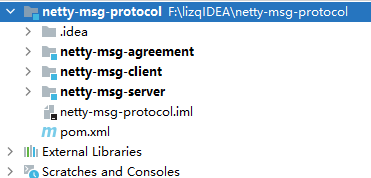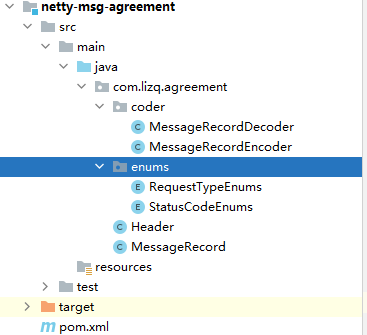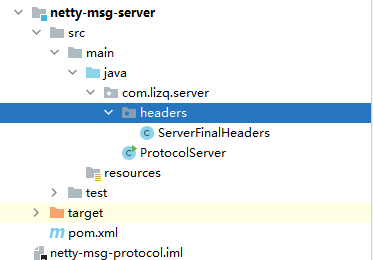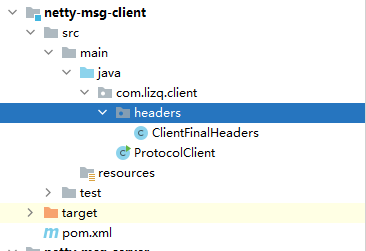Message Protocol
The concept of a message protocol sounds very tall, but what does a message protocol really mean?
Message protocol refers to how the data (messages) transmitted by both sides of the communication express their description.
For example, HTTP protocol, when a browser opens a web page, it first establishes a connection with the server, then sends a request (request mainly includes some request headers, request types, request URL s, request messages, etc.). After the server receives the request, it first parses the current request through the established rules, and then responds to the data flow that returns the response to the client. These established rules are also known as message protocols.
Custom Message Protocol
So what does a custom message typically include? For example:
- Version number,
- Message type, request/response, GET, POST, DELETE
- Message Length
- The body of the message
- Serialization algorithm
- ...
How do I customize a message protocol???
Protocol Definition
statusCode | sessionId | reqType | contentLength | content
We customized a protocol above where statusCode represents the status code, sessionId, reqType, contentLength is the request header information, and content is the message content.
The following is the definition of a custom messaging protocol through the Netty framework, as well as the process of data exchange between client and server using the current protocol.
Implement custom messaging protocol through Netty
1. Project catalogue

First, create a Maven project where netty-msg-agreement represents a custom messaging protocol, netty-msg-client represents a client, netty-msg-server represents a server, and client, server modules depend on and agree modules.
netty-msg-protocol pom.xml dependency: add netty-all dependency and lombox dependency.
<dependency>
<groupId>io.netty</groupId>
<artifactId>netty-all</artifactId>
<version>4.1.69.Final</version>
</dependency>
<dependency>
<groupId>org.projectlombok</groupId>
<artifactId>lombok</artifactId>
<version>1.18.14</version>
<scope>provided</scope>
</dependency>
2. netty-msg-agreement

MessageRecord represents the message record through which the client server delivers messages. During message delivery, the client side encodes and decodes messages through MessageRecordDecoder and MessageRecordEncoder.
The main code is as follows:
2.1 MessageRecord
/**
* Message Logging
* Status Code|Request Header (Session id | Request mode | Request body length)|Message content
*/
@Data
@AllArgsConstructor
@NoArgsConstructor
public class MessageRecord {
// Status code: 4 bytes
private int statusCode;
// Message Request Header
private Header header;
// Message Content
private Object body;
}
2.1 Header
/**
* Request Header: Custom Design
*/
@Data
@AllArgsConstructor
@NoArgsConstructor
public class Header {
// Session id: 8 bytes
private long sessionId;
// Request method: 1 byte
private byte reqType;
// Request body length: 4 bytes
private int contentLength;
}
2.3 MessageRecordEncoder-Encoder
/**
* Encoder
*/
public class MessageRecordEncoder extends MessageToByteEncoder<MessageRecord> {
@Override
protected void encode(ChannelHandlerContext channelHandlerContext, MessageRecord messageRecord, ByteBuf byteBuf) throws Exception {
System.out.println(">>>>>>>>>>>Message Encoding start>>>>>>>>>>>");
// Status line
byteBuf.writeInt(messageRecord.getStatusCode());
// Request Header
Header header = messageRecord.getHeader();
byteBuf.writeLong(header.getSessionId());
byteBuf.writeByte(header.getReqType());
Object body = messageRecord.getBody();
if (body != null){// Message content is not empty
ByteArrayOutputStream outputStream = new ByteArrayOutputStream();
ObjectOutputStream out = new ObjectOutputStream(outputStream);
out.writeObject(body);
byte[] bytes = outputStream.toByteArray();
// Message Length
byteBuf.writeInt(bytes.length);
// Message Content
byteBuf.writeBytes(bytes);
}else {// Message content is empty
byteBuf.writeInt(0);
}
// Write and refresh
channelHandlerContext.writeAndFlush(messageRecord);
System.out.println(">>>>>>>>>>>Message Encoding end>>>>>>>>>>>");
}
}
2.4 MessageRecordDecoder-Decoder
/**
* Decoder
*/
public class MessageRecordDecoder extends ByteToMessageDecoder {
@Override
protected void decode(ChannelHandlerContext channelHandlerContext, ByteBuf byteBuf, List<Object> out) throws Exception {
System.out.println(">>>>>>>>>>>Message decoding start>>>>>>>>>>>");
// Get data from byteBuf
int statusCode = byteBuf.readInt();// Get 4 bytes
Header header = new Header();
header.setSessionId(byteBuf.readLong());// Get 8 bytes
header.setReqType(byteBuf.readByte());
header.setContentLength(byteBuf.readInt());// Get 4 bytes
if (header.getContentLength() > 0){// Message length greater than 0
MessageRecord messageRecord = new MessageRecord();
messageRecord.setStatusCode(statusCode);
messageRecord.setHeader(header);
// Get message body
byte[] bytes = new byte[header.getContentLength()];
byteBuf.readBytes(bytes);// Read message body contents to bytes
ByteArrayInputStream inputStream = new ByteArrayInputStream(bytes);// java Native deserialization tool
ObjectInputStream objectInputStream = new ObjectInputStream(inputStream);
messageRecord.setBody(objectInputStream.readObject());
System.out.println("Messages received are:" + messageRecord);
// Note: Message transfer objects need to be added to `List<Object> out', if not added, the message content will not be processed by the service side receive
out.add(messageRecord);
}else {
System.out.println("Message content is empty, not parsed");
}
System.out.println(">>>>>>>>>>>Message decoding end>>>>>>>>>>>");
}
}
2.5 Enumerations
/**
* Request Mode Enumeration
*/
public enum RequestTypeEnums {
GET((byte) 1),
POST((byte) 2),
DELETE((byte) 3),
;
private byte reqType;
RequestTypeEnums(byte reqType) {
this.reqType = reqType;
}
public byte getReqType() {
return this.reqType;
}
}
/**
* Status row enumeration
*/
public enum StatusCodeEnums {
SUCCESS(0, "Success"),
FAIL(-1, "fail"),
EXCEPTION(-2, "abnormal"),
;
private int statusCode;
private String desc;
StatusCodeEnums(int statusCode, String desc) {
this.statusCode = statusCode;
this.desc = desc;
}
public int getStatusCode() {
return statusCode;
}
public String getDesc() {
return this.desc;
}
}
3. netty-msg-server

ProtocolServer is the service startup class and waits for the client to connect. ServerFinalHeaders is a service-side message processing class.
Add a netty-msg-agreement dependency to netty-msg-server pom.xml.
<dependency>
<groupId>org.example</groupId>
<artifactId>netty-msg-agreement</artifactId>
<version>1.0-SNAPSHOT</version>
</dependency>
3.1 ProtocolServer
/**
* Server
*/
public class ProtocolServer {
public static void main(String[] args) {
EventLoopGroup boss = new NioEventLoopGroup();
EventLoopGroup work = new NioEventLoopGroup(Runtime.getRuntime().availableProcessors() * 2);
ServerBootstrap bootstrap = new ServerBootstrap();
bootstrap.group(boss, work).channel(NioServerSocketChannel.class)
.childHandler(new ChannelInitializer<SocketChannel>() {
@Override
protected void initChannel(SocketChannel socketChannel) throws Exception {
socketChannel.pipeline()
.addLast(new LengthFieldBasedFrameDecoder(1024 * 1024,
13, // statusCode + sessionId + reqType
4, // Request Body Length
0,
0))
.addLast(new MessageRecordDecoder())
.addLast(new MessageRecordEncoder())
.addLast(new ServerFinalHeaders());
}
});
try {
int port = 8080;
ChannelFuture future = bootstrap.bind(port).sync();
System.out.println(">>>>>>>>>>ProtocolServer start success>>>>>>>>>>" + port);
future.channel().closeFuture().sync();
} catch (InterruptedException e) {
e.printStackTrace();
} finally {
boss.shutdownGracefully();
work.shutdownGracefully();
}
}
}
3.2 ServerFinalHeaders
public class ServerFinalHeaders extends ChannelInboundHandlerAdapter {
@Override
public void channelRead(ChannelHandlerContext ctx, Object msg) throws Exception {
MessageRecord messageRecord = (MessageRecord) msg;
System.out.println("Server Messages received are:" + messageRecord);
// Write the message back to the client
messageRecord.setBody("server data: " + messageRecord.getBody());
ctx.channel().writeAndFlush(messageRecord);
super.channelRead(ctx, msg);
}
}
4. netty-msg-client

The ProtocolClient starts the class for the client, connects to the service-side ProtocolServer through the class, and delivers messages. ClientFinalHeaders is a client-side message processing class.
Add a netty-msg-agreement dependency to netty-msg-server pom.xml.
<dependency>
<groupId>org.example</groupId>
<artifactId>netty-msg-agreement</artifactId>
<version>1.0-SNAPSHOT</version>
</dependency>
4.1 ProtocolClient
/**
* Client
*/
public class ProtocolClient {
public static void main(String[] args) {
EventLoopGroup work = new NioEventLoopGroup(Runtime.getRuntime().availableProcessors() * 2);
Bootstrap bootstrap = new Bootstrap();
bootstrap.group(work).channel(NioSocketChannel.class)
.handler(new ChannelInitializer<SocketChannel>() {
@Override
protected void initChannel(SocketChannel socketChannel) throws Exception {
socketChannel.pipeline()
.addLast(new LengthFieldBasedFrameDecoder(1024 * 1024,
13, // statusCode + sessionId + reqType
4, // Request Body Length
0,
0))
.addLast(new MessageRecordDecoder())
.addLast(new MessageRecordEncoder())
.addLast(new ClientFinalHeaders());
}
});
try {
ChannelFuture future = bootstrap.connect(new InetSocketAddress("localhost", 8080)).sync();
Channel channel = future.channel();
for (int i = 0; i < 5; i++) {
MessageRecord msg = new MessageRecord();
msg.setStatusCode(StatusCodeEnums.SUCCESS.getStatusCode());
Header header = new Header();
header.setSessionId(System.currentTimeMillis());
header.setReqType(RequestTypeEnums.POST.getReqType());
msg.setHeader(header);
String body = String.format("No.%s Bar Request Data:%s", i + 1, UUID.randomUUID().toString());
msg.setBody(body);
channel.writeAndFlush(msg);
}
future.channel().closeFuture().sync();
} catch (InterruptedException e) {
e.printStackTrace();
} finally {
work.shutdownGracefully();
}
}
}
4.2 ClientFinalHeaders
public class ClientFinalHeaders extends ChannelInboundHandlerAdapter {
@Override
public void channelRead(ChannelHandlerContext ctx, Object msg) throws Exception {
MessageRecord messageRecord = (MessageRecord) msg;
System.out.println("Client Messages received are:" + messageRecord);
super.channelRead(ctx, msg);
}
}